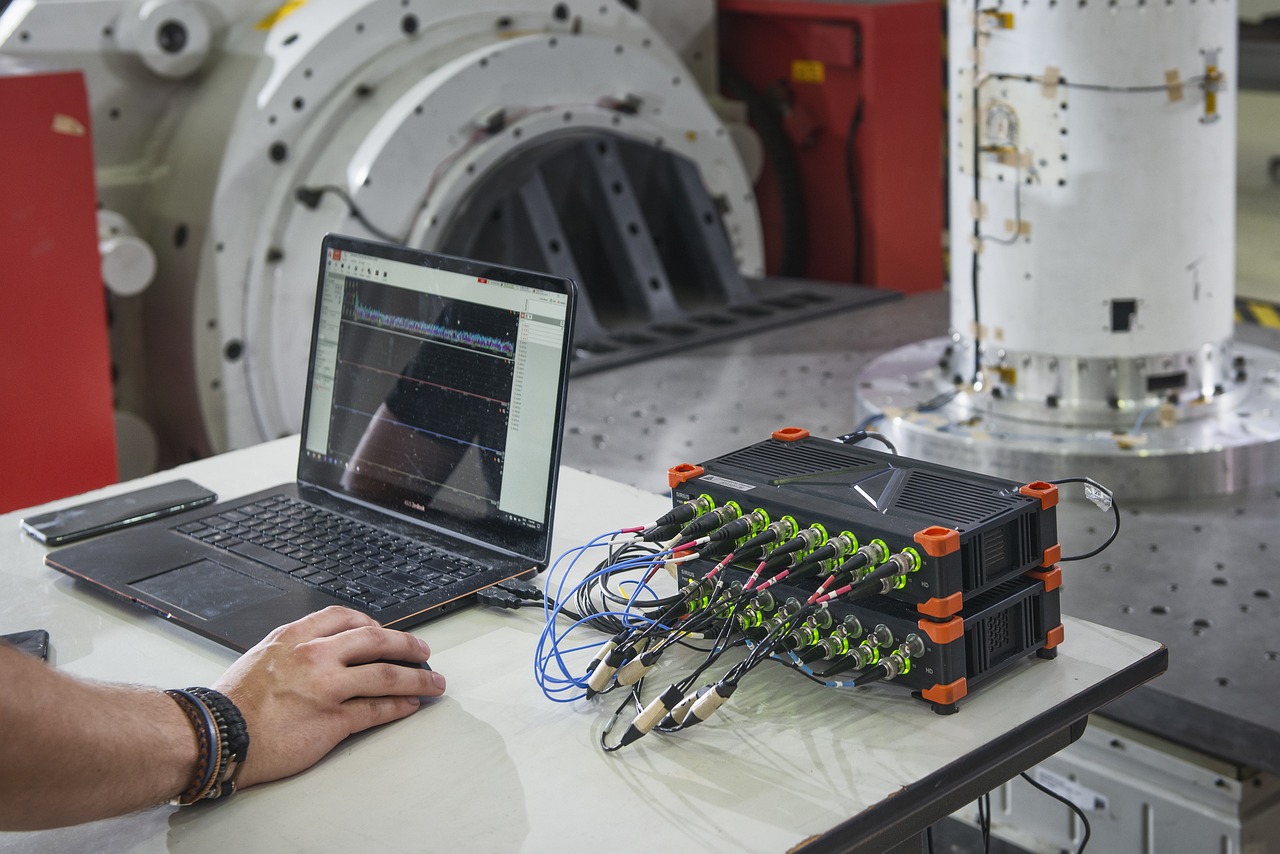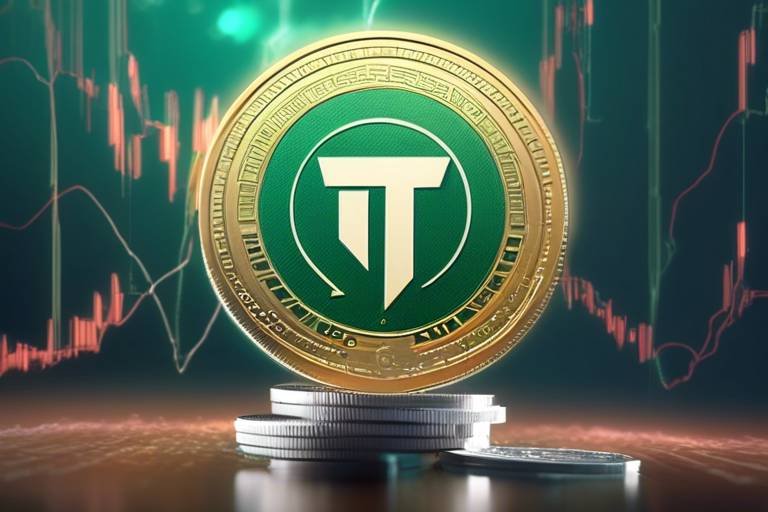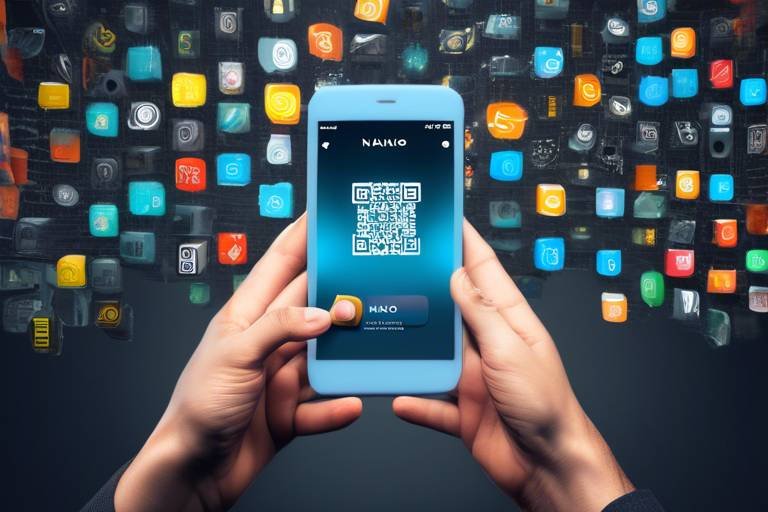Ocean Protocol - Unlocking Data with Blockchain
In today's digital age, data is often referred to as the new oil. Just like oil, data has immense value, but unlocking that value can be a complex and challenging task. Enter Ocean Protocol, a revolutionary decentralized data exchange protocol that leverages the power of blockchain technology to facilitate secure and efficient data sharing. Imagine a world where individuals and businesses can seamlessly share, access, and monetize data without compromising privacy or security. Ocean Protocol aims to make this vision a reality, empowering users to unlock the true potential of their data assets.
Ocean Protocol is not just another blockchain project; it is a comprehensive ecosystem designed to connect data providers and consumers in a way that promotes trust, transparency, and efficiency. By creating a decentralized marketplace, Ocean Protocol allows data owners to maintain control over their data while enabling consumers to access valuable datasets for analysis and insights. This unique approach transforms the way data is shared and utilized, creating new opportunities for innovation across various industries.
As we dive deeper into the world of Ocean Protocol, we'll explore its key features, the decentralized marketplace it offers, and the real-world applications that showcase its versatility. From healthcare to finance, the potential for data sharing and collaboration is limitless. So, are you ready to discover how Ocean Protocol is unlocking data with blockchain technology? Let's get started!
Ocean Protocol is a decentralized platform designed to enable secure and privacy-preserving data sharing. It connects data providers and consumers, allowing for the monetization of data assets while maintaining control over data privacy. The platform utilizes blockchain technology to ensure that data transactions are transparent and secure, fostering a new data economy where everyone can benefit from the value of data.
Ocean Protocol offers several key features that enhance the usability and accessibility of data for various stakeholders in the ecosystem. These features include:
- Data Tokenization: Transforming data assets into tradable tokens.
- Privacy Preservation: Ensuring sensitive data remains confidential.
- Marketplace for Data Services: A platform for data providers to publish their datasets.
Data tokenization is a core feature of Ocean Protocol that transforms data assets into tradable tokens. This process allows data owners to monetize their data while ensuring that consumers can access it securely and transparently. By creating a digital representation of data, tokenization opens up new avenues for data sharing and collaboration.
Tokenizing data provides numerous benefits, such as:
- Increased liquidity: Data can be bought and sold easily.
- Improved data valuation: Clear pricing mechanisms for data assets.
- New business models: Opportunities for innovative applications and services.
These advantages encourage more data sharing and collaboration across industries, paving the way for a more interconnected data economy.
Despite its benefits, data tokenization faces challenges, including regulatory hurdles and the need for standardization. Addressing these challenges is crucial for the widespread adoption of tokenized data solutions. As the landscape evolves, stakeholders must work together to create frameworks that support secure and efficient data transactions.
Ocean Protocol employs advanced privacy preservation techniques, such as differential privacy and secure multi-party computation, to ensure that sensitive data remains confidential while still being usable for analysis and insights. This commitment to privacy is essential in building trust among data providers and consumers, allowing them to engage in data sharing without fear of compromising sensitive information.
Ocean Market serves as a decentralized marketplace where data providers can publish their datasets, and consumers can discover and purchase data. This platform fosters a transparent and efficient data economy, making it easier for various stakeholders to access the data they need for their projects and analyses.
Using Ocean Market is straightforward: data providers list their datasets, and consumers can browse, filter, and purchase the data they need. This user-friendly interface encourages participation from various stakeholders, including businesses, researchers, and developers. By simplifying the data discovery process, Ocean Market promotes a more vibrant data ecosystem.
Ocean Market offers numerous benefits, including:
- Increased visibility for data providers: Data owners can showcase their datasets to a wider audience.
- Access to diverse datasets for consumers: Users can find datasets across various industries and applications.
This ecosystem promotes innovation and collaboration across sectors by facilitating data sharing and creating new opportunities for insights and advancements.
Ocean Protocol has numerous real-world applications across industries, including healthcare, finance, and artificial intelligence. These applications demonstrate the versatility and potential of the protocol in unlocking data value.
In healthcare, Ocean Protocol enables secure data sharing among institutions, facilitating research and improving patient outcomes while maintaining data privacy. This application showcases the protocol's potential to transform the healthcare landscape by allowing researchers to access valuable datasets without compromising sensitive patient information.
In the finance sector, Ocean Protocol allows for the secure sharing of financial data, enabling better analytics and insights. This capability supports informed decision-making and enhances the efficiency of financial services, paving the way for more robust and responsive financial systems.
Here are some common questions about Ocean Protocol:
- What is the main purpose of Ocean Protocol? Ocean Protocol aims to facilitate secure and efficient data sharing while empowering data owners to monetize their assets.
- How does data tokenization work? Data tokenization transforms data assets into tradable tokens, allowing for secure access and transactions.
- What industries can benefit from Ocean Protocol? Ocean Protocol has applications in various industries, including healthcare, finance, and artificial intelligence.

What is Ocean Protocol?
Ocean Protocol is a decentralized platform that has been designed to enable secure and privacy-preserving data sharing. Imagine a bustling marketplace where data providers and consumers come together, exchanging valuable insights and information while maintaining control over their own data. This is precisely what Ocean Protocol aims to achieve. By leveraging the power of blockchain technology, it creates a transparent environment where data assets can be monetized without compromising privacy.
The essence of Ocean Protocol lies in its ability to connect various stakeholders in the data economy. Data providers, whether they are individuals, companies, or organizations, can share their datasets with consumers who are looking for specific information. This connection is facilitated through a user-friendly interface that makes data sharing as seamless as possible. In this ecosystem, data is not just a commodity; it becomes a valuable asset that can be traded and utilized for various applications.
One of the standout features of Ocean Protocol is its commitment to data sovereignty. This means that data owners retain full control over their data, deciding who can access it and under what conditions. They can tokenize their data, transforming it into tradable assets that can be bought and sold in the Ocean Market. This process not only empowers data owners but also fosters a culture of collaboration and innovation across industries.
In a world where data is often seen as the new oil, Ocean Protocol stands out by ensuring that this valuable resource is utilized ethically and responsibly. It champions principles such as transparency, security, and privacy. By doing so, it paves the way for a new era of data sharing, where individuals and organizations can unlock the true value of their data without fear of exploitation.
In summary, Ocean Protocol is not just another data-sharing platform; it is a revolutionary approach to how we think about data in the digital age. By enabling secure, efficient, and privacy-preserving data exchange, it empowers businesses and individuals alike to harness the potential of their data assets. Are you ready to dive into the ocean of possibilities that this protocol offers?

Key Features of Ocean Protocol
This article explores Ocean Protocol, a decentralized data exchange protocol that leverages blockchain technology to facilitate secure and efficient data sharing, empowering businesses and individuals to unlock the value of their data.
Ocean Protocol is a decentralized platform designed to enable secure and privacy-preserving data sharing. It connects data providers and consumers, allowing for the monetization of data assets while maintaining control over data privacy.
Ocean Protocol is packed with several key features that make it a game-changer in the world of data exchange. One of the standout features is data tokenization, which transforms raw data into tradable tokens. This means that data owners can turn their valuable data into assets that can be bought and sold, creating a new revenue stream without losing control over their information.
Another essential feature is privacy preservation. In today’s world, where data breaches make headlines almost daily, maintaining privacy is paramount. Ocean Protocol employs advanced techniques like differential privacy and secure multi-party computation to ensure that sensitive information remains confidential while still being usable for analysis. This is crucial for industries that handle sensitive data, such as healthcare and finance.
Moreover, Ocean Protocol offers a decentralized marketplace known as Ocean Market. This platform allows data providers to publish their datasets, making it easy for consumers to discover and purchase the data they need. The marketplace is designed to be user-friendly, encouraging participation from a diverse range of stakeholders. Imagine a bustling marketplace where data is the currency, and everyone can trade their unique insights and information!
In summary, the key features of Ocean Protocol can be encapsulated as follows:
- Data Tokenization: Transforming data into tradable tokens for monetization.
- Privacy Preservation: Utilizing advanced techniques to secure sensitive data.
- Decentralized Marketplace: Creating a platform for easy data discovery and transactions.
These features not only enhance the usability of data but also promote collaboration across various sectors. As businesses begin to realize the potential of their data assets, the demand for platforms like Ocean Protocol will likely surge, paving the way for a more interconnected data economy.
Data tokenization is a core feature of Ocean Protocol that transforms data assets into tradable tokens. This process allows data owners to monetize their data while ensuring that consumers can access it securely and transparently.
Tokenizing data provides numerous benefits, such as increased liquidity, improved data valuation, and the ability to create new business models. These advantages encourage more data sharing and collaboration across industries.
Despite its benefits, data tokenization faces challenges, including regulatory hurdles and the need for standardization. Addressing these challenges is crucial for the widespread adoption of tokenized data solutions.
Ocean Protocol employs advanced privacy preservation techniques, such as differential privacy and secure multi-party computation, to ensure that sensitive data remains confidential while still being usable for analysis and insights.
Ocean Market serves as a decentralized marketplace where data providers can publish their datasets, and consumers can discover and purchase data. This platform fosters a transparent and efficient data economy.
Using Ocean Market is straightforward: data providers list their datasets, and consumers can browse, filter, and purchase the data they need. This user-friendly interface encourages participation from various stakeholders.
Ocean Market offers numerous benefits, including increased visibility for data providers and access to diverse datasets for consumers. This ecosystem promotes innovation and collaboration across sectors by facilitating data sharing.
Ocean Protocol has numerous real-world applications across industries, including healthcare, finance, and artificial intelligence. These applications demonstrate the versatility and potential of the protocol in unlocking data value.
In healthcare, Ocean Protocol enables secure data sharing among institutions, facilitating research and improving patient outcomes while maintaining data privacy. This application showcases the protocol's potential to transform the healthcare landscape.
In the finance sector, Ocean Protocol allows for the secure sharing of financial data, enabling better analytics and insights. This capability supports informed decision-making and enhances the efficiency of financial services.
1. What is Ocean Protocol?
Ocean Protocol is a decentralized data exchange protocol that allows data providers and consumers to share and monetize data securely while maintaining privacy.
2. How does data tokenization work?
Data tokenization transforms data into tradable tokens, allowing data owners to monetize their assets and consumers to access data securely.
3. What privacy techniques does Ocean Protocol use?
Ocean Protocol employs advanced privacy preservation techniques like differential privacy and secure multi-party computation to protect sensitive data.
4. How can I participate in Ocean Market?
You can participate in Ocean Market by either providing datasets for sale or purchasing datasets that meet your needs through its user-friendly interface.

Data Tokenization
Data tokenization is a revolutionary concept at the heart of Ocean Protocol, serving as a bridge between data ownership and monetization. Imagine your data being like a precious gem; tokenization is the process that transforms that gem into a tradable asset. By converting data assets into digital tokens, Ocean Protocol empowers data owners to maintain control while also unlocking the potential for revenue generation. This innovative approach not only enhances the liquidity of data assets but also ensures that data consumers can access these assets securely and transparently.
The process of data tokenization involves creating unique digital representations of datasets, which can then be bought, sold, or traded on the Ocean Market. This means that data providers can list their datasets as tokens, allowing consumers to purchase access to the data they need without relinquishing ownership or control. It's like renting out a vacation home: you still own the property, but others can enjoy it for a fee.
Benefits of Data Tokenization
Tokenizing data comes with a plethora of benefits, including:
- Increased Liquidity: By transforming data into tokens, owners can easily trade their assets, similar to how stocks are traded on the stock market.
- Improved Data Valuation: Tokenization allows for more accurate pricing of data assets based on market demand, leading to fair compensation for data providers.
- Creation of New Business Models: With tokenized data, businesses can explore innovative ways to monetize their data, from subscription services to pay-per-use models.
However, it's important to note that data tokenization isn't without its challenges. Regulatory hurdles can pose significant obstacles, as different jurisdictions may have varying rules regarding data ownership and monetization. Furthermore, the need for standardization in the tokenization process is crucial for ensuring interoperability among different platforms and services. Addressing these challenges will be key to the widespread adoption of tokenized data solutions.

Benefits of Data Tokenization
Data tokenization is not just a buzzword; it’s a revolutionary concept that brings a plethora of benefits to the table. By transforming data into tradable tokens, Ocean Protocol opens up a world of opportunities for both data owners and consumers. Imagine being able to unlock the value of your data without relinquishing control over it. Sounds great, right? Here are some of the key advantages:
- Increased Liquidity: Tokenizing data allows for easier buying and selling of data assets, creating a more liquid market. This means that data owners can quickly convert their data into cash, while consumers can access valuable datasets on demand.
- Improved Data Valuation: With tokenization, the value of data can be more accurately assessed based on market demand. This transparency helps data owners understand the worth of their assets and encourages informed pricing strategies.
- New Business Models: Tokenization paves the way for innovative business models that were previously unimaginable. For example, companies can now offer data-as-a-service, allowing consumers to pay for only the data they need, when they need it.
Furthermore, data tokenization fosters a collaborative environment where various stakeholders can engage in data sharing without the fear of losing control over their sensitive information. This is particularly important in industries such as healthcare and finance, where data privacy is paramount. By enabling secure transactions, tokenization encourages a culture of sharing and collaboration, ultimately driving innovation across sectors.
However, it’s essential to acknowledge that while the benefits are substantial, the journey toward widespread adoption of data tokenization is not without its challenges. Regulatory compliance and the need for standardization are hurdles that must be addressed. Nevertheless, the potential rewards make it a worthwhile endeavor for businesses looking to leverage their data assets.
In summary, data tokenization is a game-changer that enhances liquidity, promotes accurate data valuation, and enables the creation of new business models. As more organizations recognize these benefits, we can expect to see a surge in data sharing and collaboration, revolutionizing how we think about and utilize data.
What is data tokenization?
Data tokenization is the process of converting data into digital tokens that can be traded or sold, allowing data owners to monetize their assets while maintaining control over privacy.
How does data tokenization benefit businesses?
Tokenization increases liquidity, improves data valuation, and enables new business models, thus fostering collaboration and innovation across various sectors.
What challenges does data tokenization face?
Despite its benefits, data tokenization encounters challenges such as regulatory compliance and the need for standardization, which must be addressed for widespread adoption.

Challenges of Data Tokenization
While data tokenization presents an exciting frontier in the realm of data sharing, it is not without its challenges. One of the most significant hurdles is navigating the regulatory landscape. As governments and regulatory bodies around the world grapple with how to classify and manage tokenized data, data owners often find themselves in a gray area regarding compliance. The lack of clear regulations can lead to uncertainty, making businesses hesitant to adopt tokenization practices.
Another challenge is the need for standardization. Without a common set of standards for how data is tokenized, shared, and utilized, there can be significant discrepancies across platforms. This fragmentation can lead to inefficiencies and complications in data transactions, ultimately hindering the potential of tokenization.
Moreover, there is the issue of security. Although blockchain technology is renowned for its security features, the process of tokenizing data itself can introduce vulnerabilities. For instance, if the underlying data is not adequately protected during the tokenization process, it may become susceptible to breaches, undermining the very purpose of tokenization.
Additionally, the technical complexity involved in implementing data tokenization can be daunting for many organizations. Companies may lack the necessary technical expertise or resources to effectively manage the tokenization process, which can deter them from exploring this innovative approach to data sharing.
To summarize the challenges, here’s a quick overview:
- Regulatory Hurdles: Unclear regulations can create compliance issues.
- Lack of Standardization: Inconsistencies across platforms can lead to inefficiencies.
- Security Concerns: Vulnerabilities may arise during the tokenization process.
- Technical Complexity: Organizations may struggle with the implementation of tokenization.
Addressing these challenges is crucial for the widespread adoption of tokenized data solutions. As the industry evolves, ongoing dialogue among stakeholders, including regulators, data providers, and technology developers, will be essential in creating a robust framework that supports the secure and efficient sharing of tokenized data.
Q1: What is data tokenization?
Data tokenization is the process of converting data into a digital token that can be traded or used securely while maintaining privacy and confidentiality.
Q2: What are the benefits of data tokenization?
Data tokenization increases liquidity, improves data valuation, and allows for the creation of innovative business models.
Q3: What challenges does data tokenization face?
Challenges include regulatory hurdles, lack of standardization, security concerns, and technical complexity.
Q4: How does Ocean Protocol facilitate data tokenization?
Ocean Protocol provides a decentralized platform that allows data owners to tokenize their data and share it securely with consumers.

Privacy Preservation Techniques
When it comes to data sharing, privacy is a paramount concern. Ocean Protocol recognizes this need and has implemented advanced privacy preservation techniques to ensure that sensitive information remains confidential while still being utilized for valuable insights. Among these techniques, two stand out: differential privacy and secure multi-party computation.
Differential privacy is a method that adds a layer of noise to the data, making it challenging to identify individual data points. This technique allows for the analysis of datasets without compromising the privacy of the individuals within that dataset. Imagine you have a group of friends, and you want to share their average age without revealing anyone's specific age. By adding a little randomness to the data, you can still provide a useful statistic while keeping everyone’s information private.
On the other hand, secure multi-party computation (MPC) allows multiple parties to collaborate on computations without sharing their private data with one another. It’s like a group of chefs working on a recipe together, where each chef contributes their secret ingredient without revealing what it is. This technique ensures that sensitive data can be used for analysis while maintaining its confidentiality, enabling organizations to collaborate without fear of exposing their proprietary information.
These privacy preservation techniques not only enhance trust among data providers and consumers but also encourage greater participation in the data economy. By ensuring that sensitive information is protected, Ocean Protocol paves the way for a more secure and efficient data-sharing environment, fostering innovation across various sectors.
As we delve deeper into the world of data, it’s essential to understand how these privacy measures work together to create a safe space for data exchange. The combination of differential privacy and secure multi-party computation forms a robust framework that allows organizations to unlock the potential of their data without compromising privacy.
In conclusion, the integration of these privacy preservation techniques into Ocean Protocol is a game-changer. It not only protects individual privacy but also promotes a collaborative ecosystem where data can be shared, analyzed, and monetized securely. As more businesses and individuals recognize the importance of privacy in data sharing, Ocean Protocol stands as a beacon of innovation in the decentralized data landscape.
- What is Ocean Protocol? Ocean Protocol is a decentralized platform that facilitates secure data sharing and monetization while ensuring data privacy.
- How does differential privacy work? Differential privacy adds noise to data to protect individual identities while allowing for useful statistical analysis.
- What is secure multi-party computation? Secure multi-party computation allows multiple parties to compute data collaboratively without revealing their private information to each other.
- Why is privacy important in data sharing? Privacy ensures that sensitive information is protected, fostering trust and encouraging more entities to participate in data sharing.

Ocean Market: A Decentralized Data Marketplace
Ocean Market is a revolutionary platform that serves as a decentralized data marketplace, where data providers can seamlessly publish their datasets, and consumers can easily discover and purchase the data they need. Imagine a bustling marketplace where every stall is filled with valuable insights waiting to be unlocked—this is the essence of Ocean Market. It not only fosters a transparent and efficient data economy but also empowers individuals and organizations to monetize their data assets without compromising on privacy or security.
Navigating through Ocean Market is designed to be intuitive and user-friendly. Data providers can list their datasets with just a few clicks, providing detailed descriptions and setting their own pricing. On the flip side, consumers can browse through a diverse array of datasets, filtering through categories and keywords to find exactly what they need. This ease of use encourages participation from various stakeholders, from startups looking for insights to large corporations seeking comprehensive data solutions.
One of the standout features of Ocean Market is its commitment to transparency. All transactions are recorded on the blockchain, ensuring that every data exchange is secure and traceable. This not only builds trust among users but also fosters a sense of community within the marketplace. The more participants engage, the richer the ecosystem becomes, leading to a virtuous cycle of data sharing and collaboration.
The benefits of Ocean Market extend far beyond just data transactions. For data providers, the platform offers an opportunity to increase visibility and reach a global audience. They can showcase their datasets to potential buyers who are actively seeking new insights. On the other hand, consumers gain access to a vast pool of datasets that can drive innovation in their projects. Whether it's for research, analytics, or application development, the possibilities are endless.
In summary, Ocean Market stands as a beacon of innovation in the world of data sharing. By bridging the gap between data providers and consumers, it not only enhances the accessibility of valuable data but also promotes a collaborative environment where insights can be shared and utilized across various industries. As we continue to witness the growing importance of data in our digital age, platforms like Ocean Market will undoubtedly play a pivotal role in shaping the future of data economies.
- What types of data can be found on Ocean Market? Ocean Market hosts a wide range of datasets, including financial data, healthcare information, and machine learning datasets, among others.
- How does Ocean Market ensure data privacy? The platform employs advanced privacy-preserving techniques, ensuring that sensitive information remains confidential while still being accessible for analysis.
- Can anyone become a data provider on Ocean Market? Yes, anyone with valuable datasets can become a data provider. The platform is designed to be inclusive and encourages participation from various sectors.
- Is it easy to navigate Ocean Market? Absolutely! The interface is user-friendly, allowing both data providers and consumers to easily find what they need.

How to Use Ocean Market
Using Ocean Market is a seamless experience designed for both data providers and consumers. If you're a data provider, the first step is to create an account on the Ocean Market platform. This allows you to list your datasets and make them available for purchase. Once registered, you can easily upload your datasets, providing detailed descriptions and metadata to ensure potential buyers understand the value of your data. It’s like setting up a shop where you showcase your unique products!
For consumers, the process is just as straightforward. After creating an account, you can dive into the marketplace, browsing through a plethora of datasets. The interface is user-friendly, allowing you to filter and search for specific data types that meet your needs. Imagine walking through a virtual library where every dataset is a book waiting to be opened! You can view the dataset details, including pricing, quality, and usage rights before making a purchase.
Once you’ve found the data that fits your requirements, purchasing it is a breeze. Ocean Market supports various payment options, ensuring a smooth transaction process. After purchase, you gain access to the data, which you can then use for your projects, research, or analysis. This entire process encourages collaboration and innovation, making data sharing not just easy, but enjoyable!
To further enhance your experience, Ocean Market provides tools for tracking your transactions and managing your datasets. This means you can monitor how often your data is accessed and make adjustments if necessary. It’s an ecosystem that not only promotes data sharing but also empowers you to maximize the value of your contributions.
In summary, whether you're a data provider looking to monetize your datasets or a consumer in search of valuable data, Ocean Market offers an efficient and user-friendly platform. It’s like having a bustling marketplace at your fingertips, where every click brings you closer to unlocking valuable insights!

Benefits of Ocean Market
The Ocean Market offers a plethora of benefits that significantly enhance the data sharing ecosystem. One of the most compelling advantages is the increased visibility it provides to data providers. By listing their datasets on a decentralized platform, data owners can reach a broader audience, including researchers, businesses, and developers who are actively seeking valuable data. This increased exposure not only helps in monetizing data assets but also fosters a vibrant community of data enthusiasts eager to innovate.
Moreover, consumers benefit immensely from the diversity of datasets available in Ocean Market. With a user-friendly interface, they can easily browse, filter, and discover data that meets their specific needs. This accessibility is crucial for unlocking insights across various sectors, from healthcare to finance. Imagine a data scientist searching for a unique dataset to enhance their machine learning model; Ocean Market serves as a treasure trove of opportunities!
Another significant advantage is the transparency that Ocean Market brings to the data economy. Every transaction is recorded on the blockchain, ensuring that both data providers and consumers can trust the integrity of their exchanges. This transparency not only builds confidence among users but also encourages more participants to join the ecosystem, ultimately leading to a more robust data marketplace.
Furthermore, the Ocean Market promotes collaboration across industries. By facilitating data sharing, it enables businesses to leverage external datasets, driving innovation and creating new business models. For example, a healthcare provider could partner with a tech company to analyze patient data and develop predictive analytics tools, leading to improved patient outcomes.
In summary, the benefits of Ocean Market are multifaceted, encompassing:
- Increased Visibility: Data providers can reach a wider audience, enhancing monetization opportunities.
- Diverse Datasets: Consumers have access to a rich variety of data, fostering innovation.
- Transparency: Blockchain technology ensures trust and integrity in transactions.
- Collaboration: Encourages partnerships across sectors, driving new business models.
These benefits not only empower individual users but also contribute to the overall growth of a decentralized data economy. As more people recognize the value of data sharing, the Ocean Market stands to become a pivotal player in shaping a future where data is accessible, secure, and beneficial for all.
1. What is Ocean Market?
Ocean Market is a decentralized data marketplace where data providers can publish their datasets, and consumers can discover and purchase data securely.
2. How does data tokenization work?
Data tokenization transforms data assets into tradable tokens, allowing data owners to monetize their data while ensuring secure access for consumers.
3. What are privacy preservation techniques?
Ocean Protocol employs techniques like differential privacy and secure multi-party computation to keep sensitive data confidential while still enabling analysis.
4. Can anyone participate in Ocean Market?
Yes, both data providers and consumers can participate in Ocean Market, making it an inclusive platform for various stakeholders.
5. What industries can benefit from Ocean Protocol?
Ocean Protocol has applications across multiple industries, including healthcare, finance, and artificial intelligence, showcasing its versatility.

Real-World Applications of Ocean Protocol
Ocean Protocol is not just a theoretical framework; it has tangible, real-world applications that are reshaping industries. One of the most exciting aspects of Ocean Protocol is its versatility, which allows it to be adapted across various sectors. From healthcare to finance and artificial intelligence, the protocol is unlocking the value of data in ways we never imagined. Imagine a world where data can be shared securely, empowering organizations to innovate while respecting privacy. That’s the promise of Ocean Protocol.
In the healthcare sector, for instance, Ocean Protocol is revolutionizing how institutions share sensitive data. Traditionally, sharing patient information has been fraught with challenges, including privacy concerns and regulatory hurdles. However, with Ocean Protocol, healthcare providers can securely share their datasets, facilitating groundbreaking research and improving patient outcomes. By employing advanced privacy preservation techniques, such as differential privacy, healthcare organizations can collaborate without compromising sensitive information. This is akin to having a safe deposit box for data: you can access the valuable insights inside without exposing the contents to the outside world.
Moreover, the finance sector is another area where Ocean Protocol shines. Financial institutions are often overwhelmed with vast amounts of data, and extracting meaningful insights can be a daunting task. Ocean Protocol allows these institutions to share financial datasets securely, enabling better analytics and deeper insights. This capability supports informed decision-making and enhances the efficiency of financial services. For example, a bank could collaborate with a fintech startup to analyze spending patterns without revealing individual customer data. This collaborative approach leads to innovations in financial products and services, paving the way for a more efficient and responsive financial ecosystem.
Additionally, Ocean Protocol's applications extend to the realm of artificial intelligence (AI). AI thrives on data, and the more diverse the datasets, the better the models can perform. Ocean Protocol facilitates the sharing of high-quality datasets among AI developers, which can lead to improved algorithms and more accurate predictions. Imagine a scenario where different organizations contribute their datasets to train a machine learning model that predicts climate change impacts. By pooling resources, these organizations can achieve results that would be impossible in isolation.
In summary, the real-world applications of Ocean Protocol are vast and varied, demonstrating its potential to transform industries. By enabling secure and efficient data sharing, Ocean Protocol is not just unlocking the value of data; it’s creating new opportunities for innovation and collaboration. As we continue to explore the capabilities of this groundbreaking protocol, one thing is clear: the future of data is decentralized, and Ocean Protocol is leading the way.
- What is Ocean Protocol? - Ocean Protocol is a decentralized data exchange protocol that allows data providers and consumers to share and monetize data securely.
- How does data tokenization work? - Data tokenization transforms data assets into tradable tokens, allowing owners to monetize their data while ensuring secure access for consumers.
- What industries can benefit from Ocean Protocol? - Ocean Protocol can be applied in various industries, including healthcare, finance, and artificial intelligence, among others.
- Is data privacy maintained in Ocean Protocol? - Yes, Ocean Protocol employs advanced privacy preservation techniques to ensure that sensitive data remains confidential while being usable for analysis.

Healthcare Data Sharing
In the rapidly evolving world of healthcare, data is a crucial asset that can significantly enhance patient care and outcomes. However, the sharing of sensitive health information has traditionally been fraught with challenges, including privacy concerns and regulatory compliance. This is where Ocean Protocol comes into play, providing a decentralized solution that facilitates secure and efficient data sharing among healthcare institutions.
Ocean Protocol enables healthcare providers to share datasets while maintaining strict control over their data privacy. By utilizing advanced techniques such as differential privacy and secure multi-party computation, the protocol ensures that sensitive patient information remains confidential. This means that researchers and healthcare professionals can access valuable data for analysis without compromising patient privacy.
One of the most compelling aspects of Ocean Protocol is its ability to foster collaboration across various stakeholders in the healthcare ecosystem. For instance, hospitals, research institutions, and pharmaceutical companies can come together on a common platform to share data, leading to breakthroughs in medical research and improved patient care. Imagine a world where a researcher can access anonymized patient data from multiple hospitals to conduct studies on disease patterns or treatment efficacy. This kind of collaboration can accelerate the development of new treatments and improve health outcomes on a grand scale.
Additionally, Ocean Protocol's marketplace allows data providers to monetize their datasets while ensuring that they retain control over how their data is used. This creates a win-win situation where healthcare institutions can gain financial benefits from their data assets, while researchers and healthcare professionals gain access to high-quality datasets. As a result, the healthcare sector can unlock the true value of its data, driving innovation and improving patient care.
To further illustrate the impact of Ocean Protocol on healthcare data sharing, consider the following table that highlights key benefits:
| Benefit | Description |
|---|---|
| Enhanced Research | Access to diverse datasets enables more comprehensive studies and faster discoveries. |
| Improved Patient Outcomes | Data-driven insights lead to better treatment protocols and personalized care. |
| Data Monetization | Healthcare institutions can generate revenue from their data assets while ensuring privacy. |
| Collaboration | Facilitates partnerships between various stakeholders in the healthcare ecosystem. |
In summary, Ocean Protocol is revolutionizing healthcare data sharing by providing a secure, decentralized platform that empowers institutions to share valuable data without compromising privacy. This not only enhances research and patient care but also creates new opportunities for collaboration and innovation in the healthcare sector.
- What is Ocean Protocol? Ocean Protocol is a decentralized data exchange protocol that facilitates secure data sharing while preserving privacy.
- How does Ocean Protocol ensure data privacy? It employs advanced privacy preservation techniques such as differential privacy and secure multi-party computation.
- Can healthcare institutions monetize their data? Yes, Ocean Protocol allows data providers to monetize their datasets while maintaining control over their use.
- What are the benefits of using Ocean Protocol in healthcare? Enhanced research capabilities, improved patient outcomes, and increased collaboration among stakeholders are some of the key benefits.

Finance and Data Analytics
In the dynamic world of finance, data is the new gold. With the rise of Ocean Protocol, financial institutions now have the opportunity to unlock the full potential of their data assets while ensuring security and compliance. Imagine a world where banks, investment firms, and fintech startups can share and analyze data without compromising sensitive information. This is exactly what Ocean Protocol enables, creating a seamless flow of information that enhances decision-making and drives innovation.
Ocean Protocol facilitates the secure sharing of financial data through its decentralized framework. This means that institutions can collaborate on analytics without the fear of exposing their proprietary data. For instance, a bank can share anonymized customer transaction data with a fintech company to develop better credit scoring models. This collaboration not only improves the accuracy of the models but also fosters a spirit of innovation in the financial sector.
One of the standout features of Ocean Protocol in finance is its ability to support complex data analytics. By utilizing advanced algorithms and machine learning techniques, financial institutions can gain insights that were previously unattainable. For example, predictive analytics can help in identifying trends and anomalies in market behavior, allowing firms to make informed decisions swiftly. The ability to analyze vast amounts of data in real-time is a game changer, providing a competitive edge in a fast-paced market.
Moreover, Ocean Protocol encourages the creation of data marketplaces where various stakeholders can buy and sell data services. This not only increases the visibility of data assets but also enhances the liquidity of data in the financial ecosystem. Institutions can monetize their data by offering it to third parties, thereby creating new revenue streams. This is particularly beneficial for smaller firms that may not have extensive datasets but can provide valuable insights through niche data offerings.
However, as with any technological advancement, there are challenges to overcome. Regulatory compliance is a significant concern in the finance sector. Ocean Protocol addresses this by implementing robust privacy preservation techniques, ensuring that sensitive financial data remains confidential. By employing methods such as differential privacy and secure multi-party computation, the protocol ensures that data can be analyzed without revealing individual data points. This is crucial for maintaining trust among consumers and regulators alike.
In conclusion, the intersection of finance and data analytics is being revolutionized by Ocean Protocol. By providing a secure and efficient platform for data sharing, it empowers financial institutions to leverage their data assets fully. As more organizations adopt this technology, we can expect to see a transformation in how financial data is utilized—leading to smarter decisions, enhanced customer experiences, and ultimately, a more resilient financial ecosystem.
- What is Ocean Protocol? Ocean Protocol is a decentralized platform that enables secure and privacy-preserving data sharing among various stakeholders.
- How does Ocean Protocol benefit the finance sector? It allows for secure data sharing, enhances analytics capabilities, and creates new revenue streams through data monetization.
- What privacy techniques does Ocean Protocol use? Ocean Protocol employs differential privacy and secure multi-party computation to protect sensitive data during analysis.
- Can small financial firms benefit from Ocean Protocol? Yes, smaller firms can leverage the platform to monetize niche data offerings and collaborate with larger institutions.
Frequently Asked Questions
- What is Ocean Protocol?
Ocean Protocol is a decentralized platform that allows secure and privacy-preserving data sharing. It connects data providers with consumers, enabling them to monetize data assets while keeping control over their data privacy.
- How does data tokenization work in Ocean Protocol?
Data tokenization in Ocean Protocol transforms data assets into tradable tokens. This process allows data owners to monetize their data, while consumers can access it securely and transparently. Think of it like turning your data into a digital asset that can be bought and sold.
- What are the benefits of using Ocean Market?
Ocean Market provides numerous benefits, including increased visibility for data providers and access to a wide range of datasets for consumers. It fosters a transparent and efficient data economy, encouraging innovation and collaboration across various sectors.
- Can Ocean Protocol ensure data privacy?
Absolutely! Ocean Protocol employs advanced privacy preservation techniques, such as differential privacy and secure multi-party computation, ensuring that sensitive data remains confidential while still being usable for analysis and insights.
- What challenges does data tokenization face?
Data tokenization faces several challenges, including regulatory hurdles and the need for standardization. Overcoming these challenges is essential for the widespread adoption of tokenized data solutions in the market.
- How can Ocean Protocol be applied in healthcare?
In healthcare, Ocean Protocol enables secure data sharing among institutions, facilitating research and improving patient outcomes while ensuring data privacy. This application highlights the protocol's potential to transform the healthcare landscape significantly.
- What role does Ocean Protocol play in finance?
In the finance sector, Ocean Protocol allows for the secure sharing of financial data, which enhances analytics and insights. This capability supports informed decision-making and improves the efficiency of financial services.



















